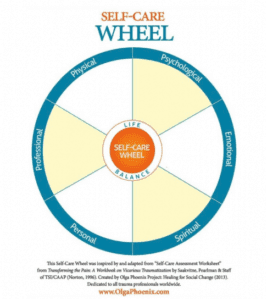August 23, 2023
The Six Types of Self-Care
If you asked me a decade ago what self-care meant, I probably would have mentioned bubble baths, face masks, and retail therapy. Popular culture depicts self-care as indulgent activities to pamper oneself that can be expensive and done occasionally.
However, my worldview shifted when I learned that caring for myself can go beyond spa days and shopping sprees. It encompasses nurturing ourselves holistically – body, mind, heart, and soul. Self-care is a radical act of asking ourselves what we truly need and taking steps to meet those needs. Self-care isn’t selfish, though it can be easy to believe it is, especially when there’s so much that needs to be done.
The analogy I like to remind myself of is that we can’t pour from an empty cup. Imagine a cup that we pour from to support others – family, friends, work, and community. To pour into others effectively, we must constantly refill our own cup through self-care.
Self-care doesn’t have to look any particular way. It can and will look different for each person because different things work for different people. The key is to focus on what helps you feel your best and to care for yourself.
Olga Phoenix’s Self-Care Wheel

One tool I love to use when thinking about the different types of self-care is Olga Phoenix’s Self-Care Wheel. This tool offers valuable insights, dividing self-care into six domains to address our well-being as a whole. The wheel can be used as a place to brainstorm ways to incorporate self-care into our lives. For some, it can be a place to assess how our self-care has been recently.
Let’s dive into the different self-care domains together. Here are a few questions to help guide your self-care practice in each area:
Personal
This domain involves your life goals and aspirations. Personal self-care includes spending time with loved ones, achieving financial goals, and pursuing hobbies or new skills.
- What kinds of activities or hobbies do you enjoy?
- What would make this month meaningful?
- By the end of this month, what would you like to have done or experienced to make this month meaningful?
- Who do you enjoy spending time with?
- How often do you make time for your friends and family?
Emotional
Emotional self-care involves saying affirmations daily, practicing self-compassion, crying, laughing, and cuddling with a pet.
- What helps you connect with your emotions?
- How have you been doing emotionally?
- What helps you feel your best emotionally?
Psychological
Psychological self-care includes activities like reading a self-help book, journaling, engaging in reflection, drawing, painting, joining a support group, or relaxing in the sun.
- What is the most helpful thing you are doing for yourself right now regarding your psychological well-being?
- What are you interested in pursuing in the future?
Physical
Physical self-care encompasses sleep, physical activity, diet, sex, alcohol & substance use, and medical needs. Activities include gym memberships, workout classes with friends, mindful eating, bubble baths, sleep hygiene, and walks.
- Which area of your physical well-being do you feel needs nurturing?
- What can you do to care for your physical health?
- What has been working well?
Professional
Examples of professional self-care can include making time for lunch, setting boundaries, seeking help, networking with others, and taking time off to maintain a healthy work-life balance.
- How can you care for yourself as it relates to your professional life?
- What kinds of boundaries would be helpful to implement?
Spiritual
Spiritual self-care includes practices like volunteering, spending time in nature, reading a book on a spiritual or religious topic, finding a spiritual community, or meditating.
- How can you engage with your spirituality or connect with a higher power?
- What practices have helped in the past?
- What new practices are you interested in exploring in the future?
- What helps you feel connected to your spirituality?
Practicing self-care is a great way to cope with life’s stressors and challenges, but it’s sometimes easier said than done. Reaching out to a therapist can be one way to add to your self-care practice. We would love to walk alongside you on your journey to a meaningful life. Our team is here to support you so you can care for others. Reach out to get started.
Written By
Jennifer Hu

Related Articles
-
Navigating Social Pressure: Tips for Teenagers
Do you want to be liked? Seen as cool, athletic, or smart? If you answered ‘yes’...
Read More -
Unlocking Effective Communication – Pt 3
In our journey through the “Unlocking Effective Communication” series (read part 1 here and part 2...
Read More -
Unlocking Effective Communication – Part 2
In my previous blog, we explored two essential concepts for successful conversations: avoiding the fool’s choice...
Read More